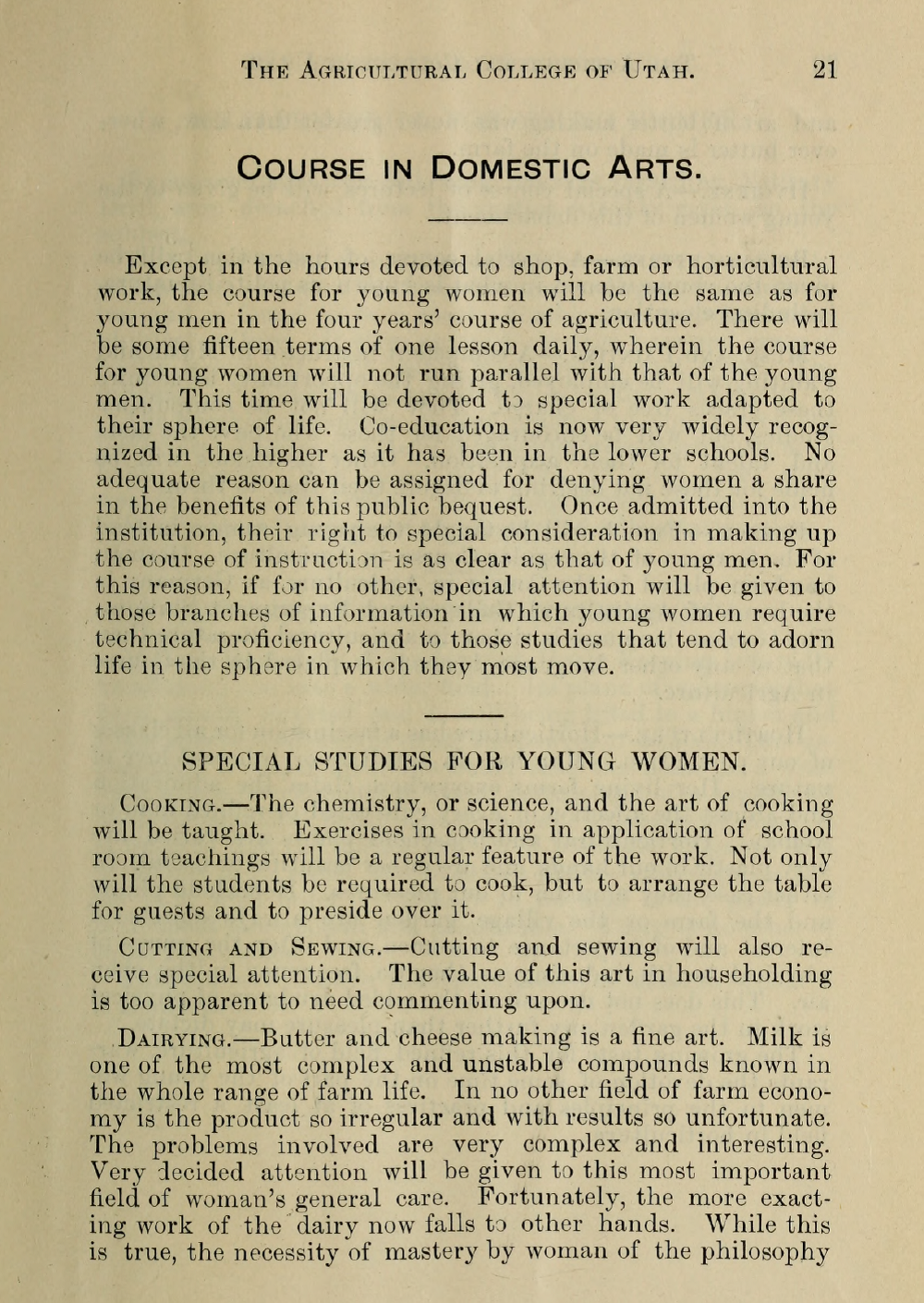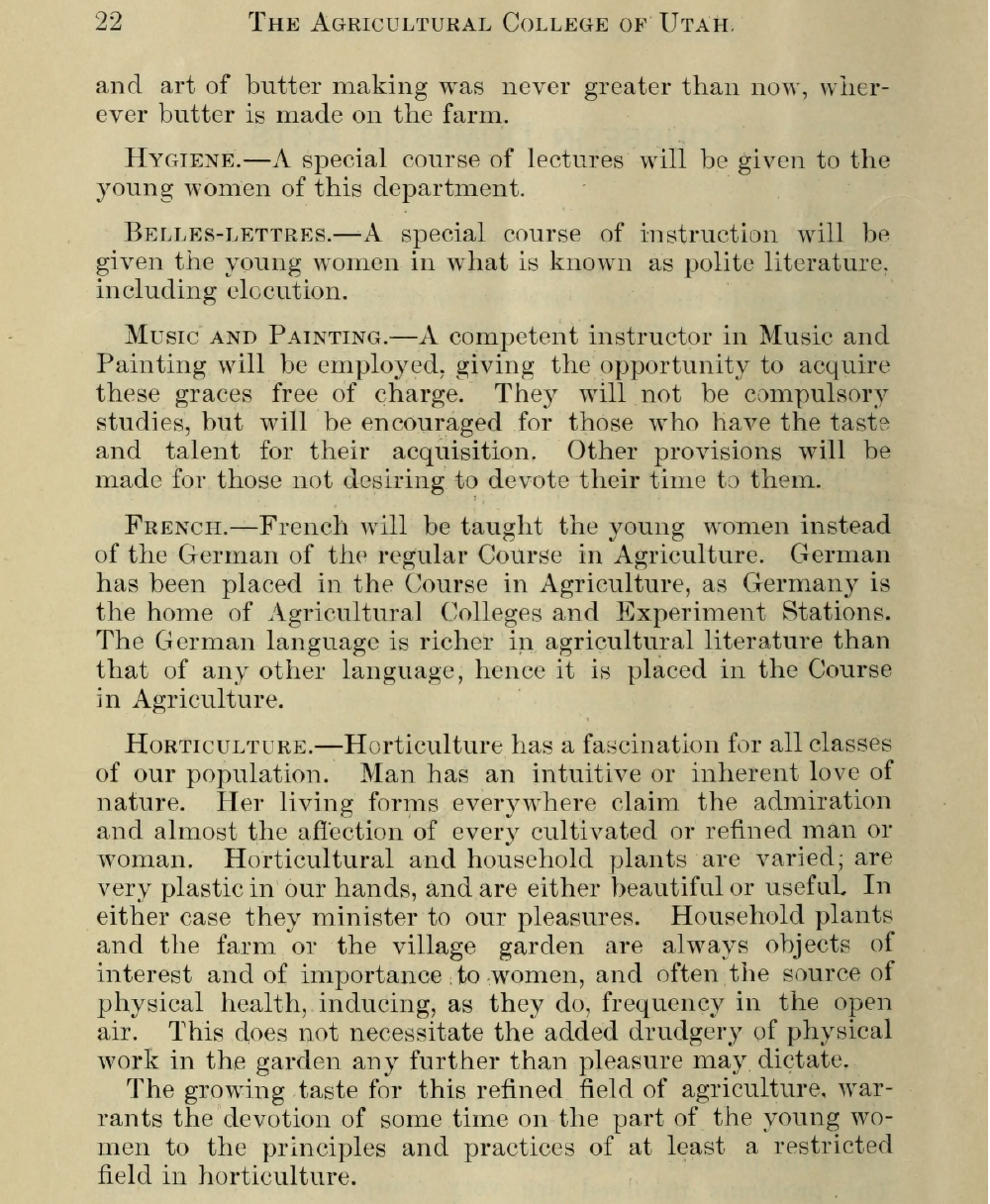Home / Modernizing America, 1889-1920 / Modern Womanhood / Higher Education and the Domestic Sciences
Resource
Higher Education and the Domestic Sciences
A document that outlines the differences between male and female education at coeducational land grant colleges like the Agricultural College of Utah.
- About
-
Curriculum
- Introduction
-
Units
- 1492–1734Early Encounters
- 1692-1783Settler Colonialism and the Revolution
- 1783-1828Building a New Nation
- 1828-1869Expansions and Inequalities
- 1832-1877A Nation Divided
- 1866-1898Industry and Empire
- 1889-1920Modernizing America
- 1920–1948Confidence and Crises
- 1948-1977Growth and Turmoil
- 1977-2001End of the Twentieth Century
- Discover
-
Search
Document Text |
Summary |
| COURSE IN DOMESTIC ARTS | COURSE IN DOMESTIC ARTS |
| Except in the hours devoted to shop, farm or horticultural work, the course for young women will be the same as for young men in the four years’ course of agriculture. There will be some fifteen terms of one lesson daily, wherein the course for young women will not run parallel with that of the young men. This time will be devoted to special work adapted to their sphere of life. Co-education is now very widely recognized in the higher as it has been in the lower schools. No adequate reason can be assigned for denying women a share in the benefits of this public bequest. Once admitted into the institution, their right to special consideration in making up the course of instruction is as clear as that of young men. For this reason, if for no other, special attention will be given to those branches of information in which young women require technical proficiency, and to those studies that tend to adorn life in the sphere in which they most move. | The Course in Agriculture is for men. The Course in Domestic Arts is for women. The two courses will be the same, with a few exceptions. The classes unique to the Course in Domestic Arts teach knowledge and skills specific to women. Women should not be denied access to higher education and they will be treated the same as men at the school. For this reason, this curriculum will focus on subjects that are particularly important for women to understand. |
| SPECIAL STUDIES FOR YOUNG WOMEN. | The following is a list of the classes that are unique to the Course in Domestic Arts. |
| Cooking.—The chemistry, or science, and the art of cooking will be taught. Exercises in cooking in application of school room teachings will be a regular feature of the work. Not only will the students be required to cook, but to arrange the table for guests and to preside over it. | Students will study cooking, how to set the table, and how to host guests. |
| Cutting and Sewing.—Cutting and sewing will also receive special attention. The value of this art in householding is too apparent to need commenting upon. | Students will study cutting and sewing. Sewing is an obvious skill for housekeepers. |
| Dairying.—Butter and cheese making is a fine art. Milk is one of the most complex and unstable compounds known in the whole range of farm life. In no other field of farm economy is the product so irregular and with results so unfortunate. The problems involved are very complex and interesting. Very decided attention will be given to this most important field of woman’s general care. Fortunately, the more exacting work of the dairy now falls to other hands. While this is true, the necessity of mastery by woman of the philosophy and art of butter making was never greater than now, wherever butter is made on the farm. | Students will study how to make butter and cheese. Making things out of milk is particularly complicated but very important. |
| Hygiene.—A special course of lectures will be given to the young women of this department. | Students will study hygiene. |
| Belles-lettres.—A special course of instruction will be given the young women in what is known as polite literature, including elocution. | Students will study literature and public speaking. |
| Music and Painting.—A competent instructor in Music and Painting will be employed, giving the opportunity to acquire these graces free of charge. They will not be compulsory studies, but will be encouraged for those who have the taste and talent for their acquisition. Other provisions will be made for those not desiring to devote their time to them. | Students will have the option to take courses in music and painting. These optional courses are free. Students who do not take music or painting will study other subjects. |
| French.—French will be taught the young women instead of the German of the regular Course in Agriculture. German has been placed in the Course in Agriculture, as Germany is the home of Agricultural Colleges and Experiment Stations. The German language is richer in agricultural literature than that of any other language, hence it is placed in the Course in Agriculture. | Students will study French. Male students in the Course in Agriculture will study German. |
| Horticulture.—Horticulture has a fascination for all classes of our population. Man has an intuitive or inherent love of nature. Her living forms everywhere claim the admiration and almost the affection of every cultivated or refined man or woman. Horticultural and household plants are varied; are very plastic in our hands, and are either beautiful or useful. In either case they minister to our pleasures. Household plants and the farm or the village garden are always objects of interest and of importance to women, and often the source of physical health, inducing, as they do, frequency in the open air. This does not necessitate the added drudgery of physical work in the garden any further than pleasure may dictate.
The growing taste for this refined field of agriculture warrants the devotion of some time on the part of the young women to the principles and practices of at least a restricted field in horticulture. |
Students will study horticulture. This will include the study of plants in houses, on farms, and in gardens. The study of horticulture can provide both pleasure and useful skills. |
Agricultural College of Utah, Excerpt from The Organization and Course of Instruction of The Agricultural College of Utah. 1890-91. Logan, Utah.
Background
By the 1890s, farm life was modernizing and consumer culture had reached the rural West. Managing a farm meant making smart decisions about what items to buy, what items to produce, and what forms of new technology to use in the fields, the stables, and the house. Many men and women believed an education in math and science was needed to effectively manage farm life. The growing home economics movement further professionalized the work of farm women.
The Morrill Act of 1862 provided states with land grants for the creation of agriculture colleges and university programs. Although it was not required by the federal government, many of the land-grant schools offered programs for women. Founded in 1888 through the Morrill Act, the Agricultural College of Utah was one of several Western schools that offered female students the opportunity to prepare for a life on the farm. The college’s first class, which began in 1890, included 33 women and 136 men. Of the eight original faculty members, one was a woman. While the primary courses were the same for men and women, specialized courses for women emphasized the differences between the genders and their post-graduation roles. For most female graduates, the future meant marriage and working on the family farm. A few women found paid work as teachers. Alternative jobs for women were only to be found in larger urban areas, which were often hundreds of miles away from home.
About the Document
These two pages are excerpts from the Agricultural College of Utah’s course book. All students would have received this book as they began their studies. The Course in Agriculture for men and the Course in Domestic Sciences for women were almost identical. Both programs required geometry, algebra, chemistry, physics, botany, geology, zoology, and mineralogy. This document outlines those classes that were unique to the Course in Domestic Sciences.
Vocabulary
- belles-lettres: The study of literature.
- botany: The study of plant life.
- compulsory: Required.
- domestic sciences: Similar to home economics. The study of the science and economics of the home, including cooking, cleaning, and taking care of children.
- elocution: Public speaking.
- faculty: Teaching staff.
- geology: The science of rocks.
- home economics: The study of the science and economics of the home, including cooking, cleaning, and taking care of children.
- horticulture: The study and practice of growing plants.
- hygiene: Cleanliness and healthy behavior.
- mineralogy: The science of minerals.
- Morril Act: A federal act passed in 1862 that provided public land for the creation of colleges and universities with agriculture programs.
- proficiency: Expertise.
- zoology: The science of animals.
Discussion Questions
- What “special” courses did women need to take and why?
- Most of the courses, particularly in math and science, were the same for men and women. Why did the college believe in teaching the genders the same material most of the time?
- Although the courses were very similar, the program for male students was called the Course in Agriculture, and the program for female students was called the Course in Domestic Sciences. Why do you think these different titles were used and what does it tell us about what male and female students might do after graduation?
Suggested Activities
- Connect this document to the life story of Ellen Swallow Richards. How did the professionalization of housework help to break down barriers between higher education, scientific research, and the domestic sphere?
- Explore higher education opportunities for women by connecting this document to the life stories of Ellen Swallow Richards, Jane Addams, and Mary Church Terrell.
- The Agricultural College of Utah prepared women for life on a farm. Based on the course descriptions, how might farm work have been different from the paid work depicted in Lewis Hine’s photographs of industrial workers or the housework described in the advertisement in Life magazine?
Themes
AMERICAN CULTURE; SCIENCE, TECHNOLOGY, AND MEDICINE; ACTIVISM AND SOCIAL CHANGE








